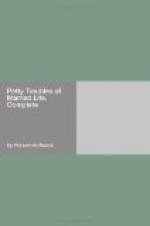“Who knows?”
“Good heavens! Why, you seem to me on the point of becoming very unhappy—or very happy.”
“Well, dear, how is it with you?”
“Oh, as for me, I have nothing as yet but a pin that pricks me: but it is intolerable.”
“Poor creature! You don’t know your own happiness: come, what is it?”
Here the young woman whispered in the other’s ear, so that it was impossible to catch a single word. The conversation recommenced, or rather finished by a sort of inference.
“So, your Adolphe is jealous?”
“Jealous of whom? We never leave each other, and that, in itself, is an annoyance. I can’t stand it. I don’t dare to gape. I am expected to be forever enacting the woman in love. It’s fatiguing.”
“Caroline?”
“Well?”
“What are you going to do?”
“Resign myself. What are you?
“Fight the customs office.”
This little trouble tends to prove that in the matter of personal deception, the two sexes can well cry quits.
DISAPPOINTED AMBITION.
I. CHODOREILLE THE GREAT.
A young man has forsaken his natal city in the depths of one of the departments, rather clearly marked by M. Charles Dupin. He felt that glory of some sort awaited him: suppose that of a painter, a novelist, a journalist, a poet, a great statesman.
Young Adolphe de Chodoreille—that we may be perfectly understood —wished to be talked about, to become celebrated, to be somebody. This, therefore, is addressed to the mass of aspiring individuals brought to Paris by all sorts of vehicles, whether moral or material, and who rush upon the city one fine morning with the hydrophobic purpose of overturning everybody’s reputation, and of building themselves a pedestal with the ruins they are to make,—until disenchantment follows. As our intention is to specify this peculiarity so characteristic of our epoch, let us take from among the various personages the one whom the author has elsewhere called A Distinguished Provencal.
Adolphe has discovered that the most admirable trade is that which consists in buying a bottle of ink, a bunch of quills, and a ream of paper, at a stationer’s for twelve francs and a half, and in selling the two thousand sheets in the ream over again, for something like fifty thousand francs, after having, of course, written upon each leaf fifty lines replete with style and imagination.
This problem,—twelve francs and a half metamorphosed into fifty thousand francs, at the rate of five sous a line—urges numerous families who might advantageously employ their members in the retirement of the provinces, to thrust them into the vortex of Paris.
The young man who is the object of this exportation, invariably passes in his natal town for a man of as much imagination as the most famous author. He has always studied well, he writes very nice poetry, he is considered a fellow of parts: he is besides often guilty of a charming tale published in the local paper, which obtains the admiration of the department.




